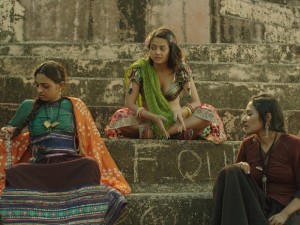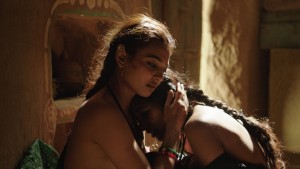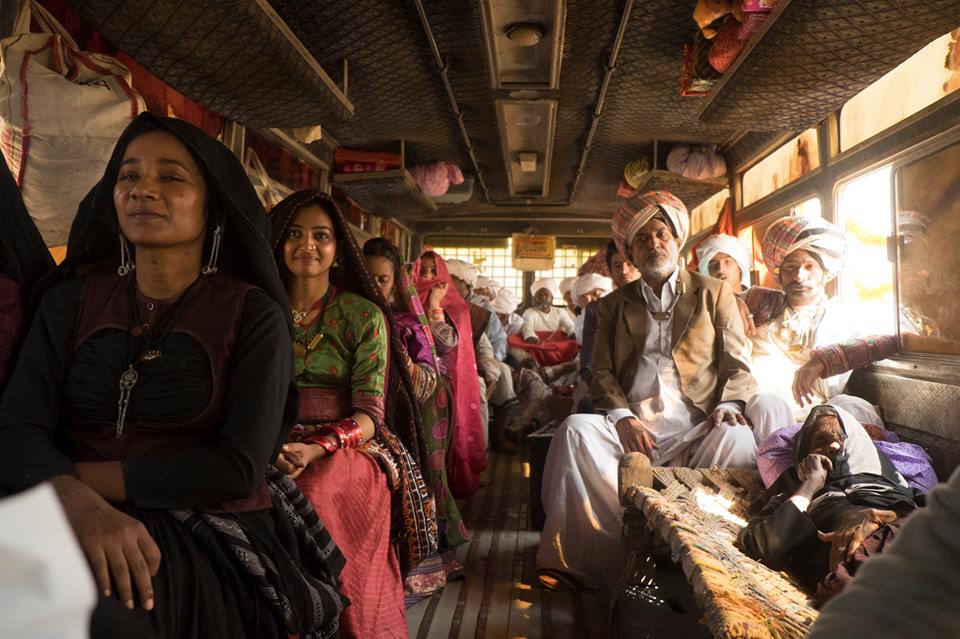What does it mean to be liberated? Truly liberated. To have an ounce of freedom or some iota of value in society. Is it the ability to make your own decisions? Or else the freedom to decide how you can be treated?
In one scene in Leena Yadav’s Parched, we see a woman excitedly tell her friends that she met a spiritual man who taught her how to dream. Because in the unforgiving world of this film, one that is so uncomfortably rooted in reality — the kind we only hear of, subconsciously aware of, and occasionally encounter on screens through hard-hitting documentaries — the freedom of women to dream is perhaps the greatest liberty they are awarded.
Parched follows the lives of three women in a village in rural Gujarat to depict the scathing reality of, both, the attitude and treatment of women, as the direct consequences of each other. Rani (Tanishta Chatterjee) is a widowed single mother attempting to provide for her family, and marry off her teenage son Gulab (Riddhi Sen) to the 15-year-old Janaki (newcomer Lehar Khan). Lajjo (Radhika Apte) is Rani’s vibrant and fun-loving best friend, despite suffering an abusive marriage. Bijli (Surveen Chawla) is an independent, strong-willed prostitute and bar dancer whose livelihood and status is dictated by the whims of men.
This is a story of three women struggling for the basic freedom to be themselves, embrace their own lives and sexuality within the confines of a male-dominant society, and how they must find camaraderie and solace in each other.

The film is set in a difficult albeit relatable world, which does take some getting used to. A world where terms like ‘wife’ and ‘whore’ are used synonymously. A world where women are frequently and overtly reminded of how much they were purchased for through dowry; where rape of teenage brides is seen as almost a rite of passage, and a foray into married life, and those with progressive views, are laughed at and shunned. Here, racism, sexism and xenophobia thrive, and education is relentlessly frowned upon, particularly for women. We frequently hear searing lines like, “girls who read make bad wives.”; things that would immediately pass off as absurd patriarchy-shaming jokes in an urban atmosphere, but all too tragic in the truth of this particular environment. A world where women are constantly blamed and derided for inadequacies of men. A world of extreme misogyny, personified.
And yet, Parched is also curiously upbeat and enjoyable, largely due to the humorous exchanges between suppressed characters yearning to express themselves, brought to life by writer Supratik Sen’s amusing dialogue. This isn’t even the uncomfortable kind of awkward situational laughter; it’s down completely to self-aware women adhering to the old ‘misery loves company’ adage. They are wonderfully provocative and playful behind closed doors, showing us that despite a society excessively weighed against them, their inherent spirit is not to be broken. The result is a movie that will leave you stiff through some harrowing scenes of rape and violence, as much as have you chuckling with amusement (followed by minor pangs of guilt for having chuckled moments ago), and one which strikes a curious tone between humour and hardship. These contrasts are all the more heightened by Hitesh Sonik’s instinctive music and its placement, which adds to the lively tone of the film.
Through these colourful characters, Parched has a distinct lack of an ‘Indie-film-feel’ to it, and isn’t the hard-hitting, gritty docu-drama one might expect. Despite its heavy themes, it is unapologetically mainstream in its sensibilities and treatment. Though there are moments which feel forced and somewhat preachy, it is clear that Leena Yadav set out to make a film that is as poignant as it is entertaining, doing so in a way that doesn’t hamper the many stark, important messages of the film.
Yet Yadav makes a clear attempt to give us unidimensional characters which aren’t strictly black and white — with women being the victims and men, the villains — but rather focuses on ho
w social conditioning is the issue, with neither gender being able to escape the regressive cultural norms at play. No one is above the reigning forces of ego, pride and honour which drive society, carved in through uncivilised centuries of habit, shown by the fact that Rani is as much the victim of repression as she is herself the repressor to her daughter-in-law.
Surveen Chawla is enjoyable to watch as Bijli who is wild, free spirited and yet silently tortured by her profession and circumstances. Indie veteran Tanishta Chatterjee yet again showcases here booming versatility as Rani, and yet the real show stealer is Radhika Apte who gives us a Lajjo as naïve and upbeat as she is damaged and resilient.

The narrative of the film strikes an interesting mix between slice-of-life and manufactured story; however, the pace does drag a bit in the early parts of the film, requiring a fair bit of patience before being rewarded with character-specific conflicts. But what is truly revelatory was how the film dealt with a number of nude scenes — handled tastefully and maturely, and somewhere, this feels like a breakthrough for Indian cinema. Not one of them seems out of place or opportunistic. Suffice to say, the courage here must be unendingly applauded. The screenplay also offers some moments of stunning beauty, such as a scene where we see a woman having consensual sex for the first time, a notion so alien and strange to her in context of her existence, the power of which is unforgettable.
However, in spite of its powerfully painful landscape, as peculiar as this sounds, the message of the film is one of hope and learning to appreciate and hold onto the small joys of life. One can only hope this gets a large scale release in India, and not fall into the truckload of issue-based films which fail to be seen by the very audience they are made for and about.
In the end, Parched offers a journey of women that feels satisfyingly complete, more so than the similarly based yet more erratic Angry Indian Goddesses, and is one of the few Hindi films of recent times that left me desperately craving a sequel. Unfortunately, life rarely offers up a sequel or second shot, forcing us to explore and make the most of being in the moment — something that these characters seem to reluctantly recognise, and then capitalise on.
Despite its unavoidable flaws, it is powerful and unmissable, for it represents the refreshing kind of mainstream cinema we so desperately need. It is an exhausting roller coaster of emotions, but one that leaves you thankful for the ride.
Rating: 4 stars
(This writer watched ‘Parched’ — unreleased in India so far — as the opening film of the 2016 London Indian Film Festival)







Leave A Comment
You must be logged in to post a comment.